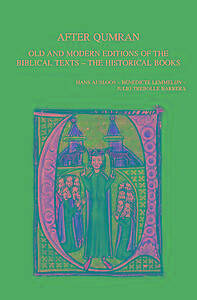
- Afhalen na 1 uur in een winkel met voorraad
- Gratis thuislevering in België vanaf € 30
- Ruim aanbod met 7 miljoen producten
- Afhalen na 1 uur in een winkel met voorraad
- Gratis thuislevering in België vanaf € 30
- Ruim aanbod met 7 miljoen producten
Zoeken
After Qumran
Old and Modern Editions of the Biblical Texts - The Historical Books
Lemmelijn B. Ausloos H., Barrera J. Trebolle
€ 170,95
+ 341 punten
Omschrijving
The discoveries of the Dead Sea, as we are used to call them, have changed the scholarly landscape of textual criticism to a considerable, if not enormous, extent. The state of the art with respect to both the textual development and the interpretation of the literary and theological form of individual biblical books has been seriously challenged. It appears as if no single book can escape from reinterpretation from this perspective. One of the collections of texts that can serve as an outstanding example on which the Dead Sea Scrolls have shed new light, can be found in the so-called Historical Books. Against that background, and in co-operation with the Louvain Centre for Septuagint Studies and Textual Criticism (CSSTC) of the Katholieke Universiteit Leuven (BE) and the Universidad de Alcala (ES), the Universidad Complutense de Madrid (ES) has organised an international expert symposium on the theme: "After Qumran: old and new editions of biblical texts - the Historical Books" (31 May - 2 June 2010). This volume presents the proceedings of this highly enriching symposium.
Specificaties
Betrokkenen
- Auteur(s):
- Uitgeverij:
Inhoud
- Aantal bladzijden:
- 334
- Taal:
- Engels
- Reeks:
- Reeksnummer:
- nr. 246
Eigenschappen
- Productcode (EAN):
- 9789042925731
- Verschijningsdatum:
- 6/03/2012
- Uitvoering:
- Paperback
- Formaat:
- Trade paperback (VS)
- Afmetingen:
- 160 mm x 239 mm
- Gewicht:
- 566 g

Alleen bij Standaard Boekhandel
+ 341 punten op je klantenkaart van Standaard Boekhandel
Beoordelingen
We publiceren alleen reviews die voldoen aan de voorwaarden voor reviews. Bekijk onze voorwaarden voor reviews.








